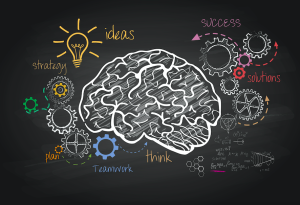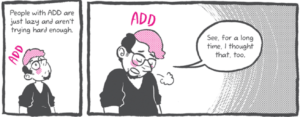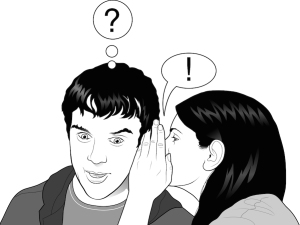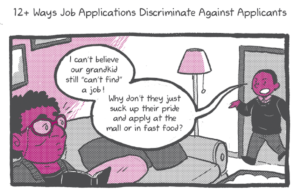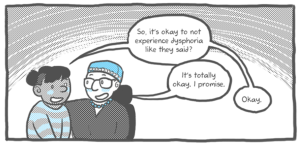I was born with cerebral palsy. And ever since the age of thirteen, I’ve spent significant amounts of time with other people with physical disabilities.
And while we all may have different impairments, there are many experiences that are universal among those of us with physical disabilities – and particularly very visible disabilities.
And the most common complaint I hear among my fellow physically disabled peers is a variation on statements like, “We’re not ret*rded. Our minds are fine. It’s our legs that don’t work.”
Some even go so far as to complain about having to share services and transportation (like paratransit, which is door-to-door transportation for people with disabilities) with people who have cognitive or intellectual disabilities.
And I get it. I do.
As a teenager, I resented having to ride the same bus to school with the “life skills” students who were cognitively and intellectually disabled. (I realize now, of course, that I really could have benefitted from some of that “life skills” instruction.)
I complained when the bus was late, because I was missing parts of advanced placement classes. I thought that it was more important for me to get to school on time than my fellow bus riders because I was in higher-level classes.
Luckily, as I began to learn more about disability culture, I met people with cognitive and intellectual disabilities who taught me to recognize how those feelings were negatively impacting everyone in the disability community.
I’m not perfect – years of social conditioning take a long time to undo – but I’m a lot better than I was just a few years ago.
And what I’ve come to realize is that the truth is that, whether they want to admit it or not, a lot of physically disabled people say these things because they’re afraid. They see cognitively disabled people as different from themselves, and they don’t understand that difference. And that difference breeds misunderstanding.
It’s the exact same reason a lot of non-disabled people don’t want to associate with physically disabled people.
It’s the worst type of hypocrisy – transferring the stigma and stereotypes that we hate onto other people. It does nothing to dispel the stigma. Instead, it just transfers them to a different group of people. That’s not the type of person we should be aiming to be.
This twisted game of “pass the stigma” has a lot to do with the way society treats people with disabilities. We’re routinely patronized, discriminated against, and ignored. We’re assumed to have the mental capacity of infants, even if we’re full-grown adults. We’re abused at abominably high rates.
And all of this stems from the concept of what autistic activist Mel Baggs calls “being an unperson.”
Baggs says:
Being an unperson means that people talk in front of you as if you aren’t there. If they know you understand them, it means you’re not enough of a person for it to matter…
Being an unperson means that your life is not a real life. It means being treated worse than most people would treat their own pet gerbil, and with less guilt. It means that your existence seems to fill people with disgust and fear. People see and describe you as a hollow shell, a body without a soul, a changeling child or a vegetable. Or else they romanticize your life, calling you a special angel on earth…
Being an unperson means being treated like a child (which should really make people think about how they view children), or at best like a beloved pet. It means that if you do something real, important, and meaningful to you, people will think it’s cute. It means being spoken to in a voice people normally use on children…
The difference between an unperson and a real person is not a difference of what is called degree or kind of impairment or disability.
When you’re treated like an unperson, you become so desperate to show that you’re a “real person,” as Baggs put it, that you will say or do anything, even if it means putting other people down.
As physically disabled people, we think that proving ourselves as “smart” will give us our gold star of personhood. If we prove ourselves to be intellectually capable in traditional ways, then society will be able to look past our physical limitations to see us as people, just like everyone else.
The fact that we feel our bodies are something to be looked past is a telling reminder of how society treats people who don’t conform.
But instead of using that tactic and climbing on the backs of cognitively disabled people in order to earn our gold star, we should be questioning why that tactic is necessary at all.
I know there are a lot of physically disabled people out there who say things like “our minds are fine” and think they’re smashing stereotypes and progressing the disability rights movement. But I’m here to tell you why that’s not cool.
Here are three reasons why saying things like “our minds are fine” and “we’re not ret*rded” is super fucked up.
1. It Punches Down Instead of Punching Up
When physically disabled people say things like “our minds are fine,” it’s implying that they’re insulted by the fact that anyone would think otherwise.
It distances yourself from people who are intellectually disabled. I’ve seen some people with physical disabilities go so far as to imply (or outright state) that people with intellectual disabilities are disgusting, weird, and animalistic.
Why does this matter? Well, first of all, it’s just mean!
The unspoken end to the sentence “Our minds are fine” is “because I’m afraid you’ll think otherwise.” They don’t want to be mistakenly viewed as cognitively disabled.
The sad part is, those who are guilty of saying such statements usually don’t think about how this makes cognitively disabled people feel, or they assume that cognitively disabled people don’t have the capability of understanding the meaning of these statements.
A lot of this has to do with the capitalist ideas of worth that are discussed below. Physically disabled people place themselves above cognitively disabled people because society tells us that anyone who can’t achieve in narrow, predefined ways is automatically inferior. So we feel the need to prove that we can achieve in those narrow, pre-defined ways.
However, instead of conforming to the dominant system, we need to recognize the ways that the current ideals of our society hurt everybody – non-disabled, physically disabled, and cognitively disabled people alike – and work on changing them.
2. It Fragments the Disability Rights Movement
The disability rights movement, admittedly, was started mostly by physically disabled people, especially privileged white men like Justin Dart and Ed Roberts. Those physically disabled pioneers made some much-needed strides in the movement.
But in recent years, cognitively and intellectually disabled people have been leading their own revolution.
Everything that physically disabled people have fought for, intellectually disabled people are fighting for, too. We all want equal education, employment, and the freedom to live on our own terms.
Disability is the world’s largest minority, with over 12% of people in the US reporting a disability in 2013. And 5% of people in the US reported a cognitive disability in the same year.
People with cognitive and intellectual disabilities are a significant portion of the disability community, and if we exclude them, we’re shooting ourselves in our own feet, so to speak.
We should be working together, not trying to tear each other down.
3. It Justifies Ableism Against Cognitively Disabled People
There are many microaggressions that we as disabled people face on a daily basis, such as being talked to in a high pitched voice, talking to a companion or caregiver instead of the disabled person, and people having low expectations (both academically and generally) of us.
A lot of physically disabled people make the mistake of thinking that this sort of treatment is “treating us like” we’re cognitively disabled. And that sort of thinking is actively harmful because it suggests that cognitively disabled people deserve to have all those things directed at them.
No disabled person, regardless of type of disability or level of intelligence, deserves to be talked to in a voice that would more appropriate for a rambunctious puppy than a human.
Our society places a lot of emphasis on intelligence. In our capitalist society, intelligence is a competition, with the winners – the “smartest” – gaining access to better education, which leads to better employment and more productive work.
Because those with intellectual and/or cognitive disabilities may not be able to prove their intelligence through traditional means like testing or higher education, they have less worth in our society.
When physically disabled people fear being treated like cognitively disabled people, they really fear being assigned the same label of less worth. However, we should be fighting so that no one gets viewed as less worthy than anyone else.
4. It Reinforces the Mind/Body Dichotomy
This is perhaps most insidious.
We’ve been trained to think of the mind and the body as two very separate things, as evidenced by statements that say disabled people who are able to prove their intelligence in conventional ways are “trapped inside their own bodies” (this is often said about Stephen Hawking).
But our minds are part of our bodies, whether we like it or not, and our experiences in life influence the way we think and experience the world on a daily basis.
For example, it’s well documented that mental illnesses can influence the body. As someone with generalized anxiety disorder and obsessive compulsive disorder, I can attest to the bodily symptoms that come with mental illness – the insomnia, the nausea, the lack of appetite. But the process can happen in reverse as well.
Pain influences the mind. Our experiences in life influence our minds.
And the line of thinking that says our minds are untouched by our physical condition is particularly ludicrous when you think about brain-based disabilities like cerebral palsy (my own physical disability).
If we consider our minds to be part of our brains, then those with brain-based disabilities most certainly don’t have “fine minds.”
If we deny the influence of disability on our minds, it can be potentially catastrophic.
When I was diagnosed with my anxiety and OCD, it was like my world turned upside down. I had spent so long trying to categorize my disabilities as purely physical. I couldn’t figure out how to fit these new disabilities into my existing mindset.
The sooner we acknowledge that all disabilities are a whole body, whole mind experience, the better we’ll be.
***
It’s important to realize, as physically disabled people, that the discrimination we face and the discrimination that people with intellectual and cognitive disabilities face stem from the same source of fear and stigma. And that goes for stigma both within ourselves and in the larger world. When we’re afraid to be like “those people” who are cognitively and intellectually disabled, we’re not doing anyone any favors. In fact, we’re only reinforcing the notion that narrow views of “intelligence” should be what determine a person’s worth.
The good news is, people can change! If we start recognizing these harmful ideas and actions within ourselves, we can take the first steps towards a more respectful and empowering mindset. Media representation, like A&E’s new docuseries Born This Way, goes a long way toward advancing the idea that all people, including intellectually and cognitively disabled people, are intelligent and worthy of respect.
Instead of trying to prove our worth through intelligence, let’s start from a baseline of assuming everyone is human, everyone is valuable, and everyone has something to contribute. Let’s move from “our minds are fine” to “all minds are fine.”
[do_widget id=’text-101′]
Cara Liebowitz is a Contributing Writer for Everyday Feminism. She is a multiply-disabled activist and writer currently pursuing her M.A in Disability Studies at the CUNY School of Professional Studies in Manhattan. Her published work includes pieces in Empowering Leadership: A Systems Change Guide for Autistic College Students and Those with Other Disabilities, published by the Autistic Self Advocacy Network, and the Criptiques anthology. Cara blogs about disability issues large and small at That Crazy Crippled Chick. You can check her out on Twitter @spazgirl11.
Search our 3000+ articles!
Read our articles about:
Our online racial justice training
Used by hundreds of universities, non-profits, and businesses.
Click to learn more


